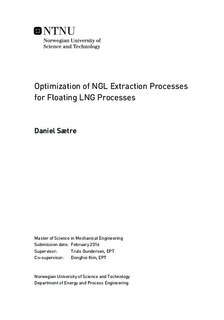Optimization of NGL Extraction Processes for Floating LNG Processes
Master thesis
Permanent lenke
http://hdl.handle.net/11250/2402920Utgivelsesdato
2016Metadata
Vis full innførselSamlinger
Sammendrag
Removal of heavy hydrocarbons from natural gas streams is necessary in all liquefaction processes to prevent freeze-out in the main cryogenic equipment. In addition, more valuable products are obtained giving the process an economical benefit. The process of removing natural gas liquids (NGL) is either done upstream the liquefaction process, or as an integrated part of the pre-cooling of the gas. Both of these possibilities were studied in this master thesis.
The purpose of the thesis is to use the built in Hyprotech SQP optimizer in Aspen HYSYS software program to optimize four different NGL extraction processes. The results have been used to evaluate and compare the different extraction schemes, focusing on performance parameters. Simulation models were used to test the robustness of the optimizer, and to study how it coped with small changes. This is a relevant topic, as the goal for many gas projects is to optimize the process efficiency of the plant.
The results suggest that the Hyprotech SQP optimizer is very sensitive to changes in the setup of the derivative utility. Any changes to input data in the optimizer will affect the results obtained. The optimizer should always be configured after the modeller has made a final decision on the variables start and boundary values. When configured correctly, the optimizer produces good simulation results that satisfy the process constraints.
The optimized processes were improved by 19 - 21 % compared to the initial objective function values. The integrated APCI process proved to be the best performing NGL extraction scheme. It had the best performance for criteria process complexity, process safety, product recovery, and production capacity. The upstream Fluor process had the lowest specific power, and was therefore leading among the schemes in process efficiency.
In conclusion, it is challenging to set up the derivative utility and optimizer parameters properly. On the other hand, if configured correctly, the Hyprotech SQP optimizer has the ability to provide substantial improvements to a process model.
